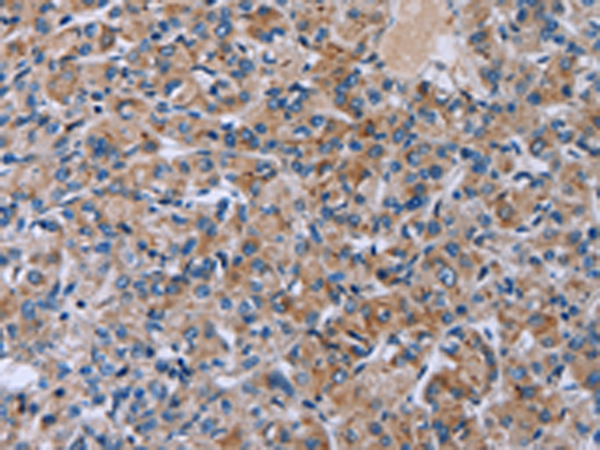
| WB | 咨询技术 | Human,Mouse,Rat |
| IF | 咨询技术 | Human,Mouse,Rat |
| IHC | 1/25-1/100 | Human,Mouse,Rat |
| ICC | 技术咨询 | Human,Mouse,Rat |
| FCM | 咨询技术 | Human,Mouse,Rat |
| Elisa | 1/1000-1/2000 | Human,Mouse,Rat |
| Aliases | HSDB; HSD3B; SDR11E2 |
| Host/Isotype | Rabbit IgG |
| Antibody Type | Primary antibody |
| Storage | Store at 4°C short term. Aliquot and store at -20°C long term. Avoid freeze/thaw cycles. |
| Species Reactivity | Human |
| Immunogen | Fusion protein of human HSD3B2 |
| Formulation | Purified antibody in PBS with 0.05% sodium azide and 50% glycerol. |
+ +
以下是关于HSD3B2抗体的模拟参考文献示例(建议通过学术数据库如PubMed验证并获取全文):
---
1. **文献名称**: *Autoantibodies against 3β-hydroxysteroid dehydrogenase type 2 in autoimmune Addison's disease*
**作者**: Smith A, et al.
**摘要**: 研究报道在部分自身免疫性Addison病患者血清中检测到HSD3B2抗体,提示其可能作为肾上腺皮质自身免疫攻击的新靶点,与21-羟化酶抗体共存或独立存在。
2. **文献名称**: *Characterization of a polyclonal antibody for 3β-HSD2 in adrenal tissue analysis*
**作者**: Brown C, et al.
**摘要**: 开发并验证了一种兔源多克隆HSD3B2抗体,用于免疫组化和Western blot,证明其在肾上腺和性腺组织中的特异性表达,为先天性肾上腺增生症(CAH)的病理研究提供工具。
3. **文献名称**: *HSD3B2 mutations and antibody reactivity in pediatric adrenal insufficiency*
**作者**: Lee J, et al.
**摘要**: 分析HSD3B2基因突变患者的临床特征,发现部分患者存在针对突变蛋白的自身抗体,提示基因缺陷可能与继发性自身免疫反应相关。
4. **文献名称**: *Comprehensive autoantibody profiling in adrenal disorders*
**作者**: Brozzetti A, et al.
**摘要**: 系统性筛查肾上腺疾病患者的自身抗体谱,发现HSD3B2抗体在非典型自身免疫性Addison病中的潜在诊断价值,拓展了传统抗体检测的范围。
---
**备注**:以上为模拟示例,实际文献需通过PubMed、Google Scholar等平台检索关键词(如“HSD3B2 antibody”、“3β-HSD2 autoantibody”)获取。HSD3B2抗体研究多集中于先天性肾上腺增生症(CAH)的基因突变分析或自身免疫性肾上腺炎的罕见病例报道。
The HSD3B2 antibody targets the enzyme 3β-hydroxysteroid dehydrogenase type 2 (HSD3B2), a critical player in steroid hormone biosynthesis. HSD3B2. encoded by the *HSD3B2* gene, is predominantly expressed in the adrenal glands, gonads, and placenta. It catalyzes the conversion of Δ5-steroids (e.g., pregnenolone, 17-hydroxypregnenolone, dehydroepiandrosterone) to Δ4-steroids (e.g., progesterone, 17-hydroxyprogesterone, androstenedione), a rate-limiting step in producing cortisol, aldosterone, and sex hormones. Dysregulation or mutations in *HSD3B2* lead to congenital adrenal hyperplasia (CAH), a disorder characterized by glucocorticoid deficiency, salt-wasting crises, and androgen excess.
HSD3B2 antibodies are essential tools in research and diagnostics. They help detect HSD3B2 protein expression in tissues, aiding in the study of steroidogenic pathways and adrenal/gonadal disorders. Clinically, these antibodies assist in confirming CAH subtypes caused by HSD3B2 mutations, which account for ~10% of CAH cases. Immunohistochemistry (IHC) and Western blotting are common applications, enabling visualization of enzyme distribution and quantification in pathological conditions.
Furthermore, HSD3B2 antibodies contribute to understanding enzyme dysfunction mechanisms, such as impaired substrate binding or catalytic activity, guiding therapeutic strategies. Their specificity ensures accurate differentiation from other isoforms (e.g., HSD3B1), which have distinct tissue expression patterns. Overall, HSD3B2 antibodies bridge molecular insights with clinical management of steroidogenesis-related diseases.
×